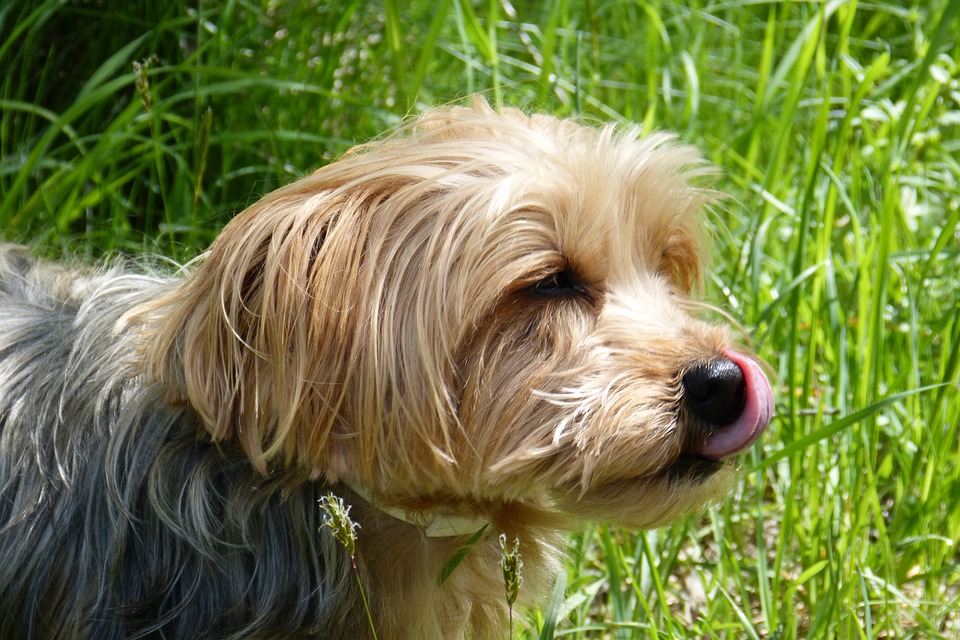Obviously, dogs can’t verbalize how they are feeling to us beyond perhaps a bit of whining or barking, and that’s pretty non-specific and really difficult to interpret. If you have a pup that licks a lot, you might be wondering why. Therefore, we have put together some information to hopefully answer the question, “Why does my dog lick so much?”
Why Does My Dog Lick So Much?
There are many cases where/what your dog is licking can give you an idea that something localized and specific is bothering him or her. If your dog is licking between his or her toes, for example, it would be logical to check that area to see if there is a burr, a splinter or a sore that he is worrying. If your pup is licking his or her tail, or the base of his or her rump, you may consider a flea problem or an anal gland irritation. Additionally, sometimes your dog licks your face in greeting or licks your arms just because.
Reasons Why Your Dog May Be Licking Excessively
- Something hurts. This is not always something obvious, such as the burr between the toes. Your pup may be licking because of inflammation or infection in the skin, arthritis pain in a joint or even a tingling or numb sensation for a nerve problem.
- Nausea. If you think about it, when your stomach is hurting you tend to get a bad taste in your mouth or you produce a bit of excess saliva that can make you swallow or lick your lips. This is also the case for dogs, in which case any underlying disorder that produces nausea could cause your dog to lick a lot.
- Hunger or dehydration. Being hungry or having a dry mouth can also result in increase licking in your dog.
- Dental Disease, oral lesion or foreign object. Anything painful or abnormal in your pup’s mouth could make him lick excessively as well.
- Neurological problems. When dogs seizure, for example, they don’t always have full-blown, whole body, grand mal seizures. Sometimes seizures can be very localized twitches. Thankfully, we don’t see many dogs with canine distemper virus infections anymore, but when dogs are infected, they can develop systems commonly (and aptly) called “chewing gum fits.”
- Cognitive Dysfunction. Older dogs that develop dementia can present for excessive licking.
- Obsessive Compulsive Disorder. It is not uncommon for dogs to develop excessive licking (even to the point of producing physical trauma to their skin – i.e. lick granuloma lesions). This can occur for a variety of psychological reasons, including stress, anxiety, separation, boredom, etc.
How Do You Know What’s Making Your Dog Lick?
Your veterinarian will want to receive a very thorough history of the issue and make as question such as:
- When did it start?
- When does it happen?
- How long does it go on?
- Can you easily distract/stop the behavior?
- If you stop it, does he go right back to licking?
- Can you determine if the dog engages in the behavior when no one is there to see it by videotaping your dog when he is alone?
You will also want to make sure to mention any other clinical or behavioral changes you have noticed in your dog, in case they are related — from personality or activity changes to changes in diet, appetite or water intake. Lastly, make sure to consider whether anything has changed in your dog’s environment that might be upsetting him or her, such as:
- Did someone move away?
- Did someone move back?
- Is there construction going on next door?
How Do You Stop Your Dog From Licking?
If your vet at All Pet finds an underlying medical disorder, we will prepare a specific treatment to address that issue. If stress, boredom or something environmental is the presumed cause then your veterinarian will discuss ways to decrease your dog’s anxiety and/or increase his comfort/happiness. Behavioral modification or the administration of mood enhancing medications may also be a treatment option.
This is just the basic information on “Why does my dog lick so much?” It is important to keep in mind that excessive licking can be an extremely complex and frustrating problem to resolve. Contact All Pets Veterinary Medical Center with the link below for more information!

















Jessica Trinque liked this on Facebook.
Alfred Hanna liked this on Facebook.